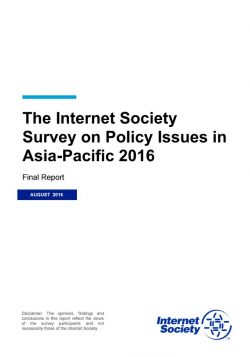Introduction
An initiative of the Asia-Pacific (APAC) Regional Bureau, the Internet Society Survey on Policy Issues in Asia-Pacific is an annual, cross-sectional study of the attitudes of Internet stakeholders toward topical Internet policy concerns in the region. Now in its third installment, this year’s study aims to take an indepth look at multi-stakeholder participation in Internet policymaking, and to gain further insights on two important areas of concern in the region: Internet access and online security. This report provides an overview of the survey’s findings, which we believe will contribute to informed policy debates and discussions — both in the region and globally.
Highlights
- Access was the most mentioned Internet policy concern in the past year
- Cybersecurity was the top issue that stakeholders felt needed attention from policymakers
- 77% of respondents did not have an opportunity to participate in policymaking for the Internet in the past year
- 59% felt their privacy is not sufficiently protected when they use the Internet
- Only 9% thought that government policies on Internet security fully reflected their own online concerns
- 66% believed that government policies on Internet security are not fully appropriate to the real risks encountered online
